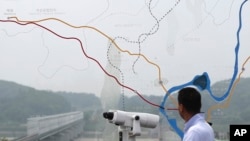South Korea proposed military talks and family reunions with North Korea on Monday to reduce the increasing potential for conflict over Pyongyang’s continued development of nuclear weapons and ballistic missiles.
“The Defense Ministry proposes to hold a military talks between the two Koreas on July 21 at Tongilgak in North Korea to stop all hostile actions which heightens military tensions at the border,” said Seoul’s Vice Defense Minister Seo Joo-seok on Monday.
Military talks
Tongilgak is a North Korean building at the Panmunjom truce village on the border used in the past for inter-Korea talks. The last government-level meetings were held in December, 2015.
Since South Korean President Moon Jae-in took power in May, his government has tried to engage the North to reduce tensions, including offers of humanitarian aid, non-political exchanges and reviving the inter-Korean military hotline that Pyongyang cut off in early 2016 after Seoul shut down the jointly run Kaesong Industrial complex to punish the North for its nuclear testing and long-range rocket launches.
But so far the Kim Jong Un government has rejected most of these overtures. Analysts say South Korea may be willing to suspend loudspeaker broadcasts at the border that are highly critical of the North Korean leader to re-establish contact.
“Once that is established, then both sides can understand what the other is seeking. They can signal to the other side what they want, what problems or issues they have with the other side,” said Daniel Pinkston, a North Korea analyst with Troy University in Seoul.
North Korea has called for the suspension of South Korea-U.S. joint military exercises, but Pinkston said that is unlikely given Pyongyang’s repeated ballistic missile launches, including the July 4 test of what some experts say was an intercontinental ballistic missile (ICBM) with the potential range to reach Alaska, although the U.S. disputes this claim.
There are also reports of increased activity at the Yongbyon uranium enrichment facility that could indicate plutonium production underway in the last year to further increase the North’s nuclear weapons stockpile.
Family reunions
The South Korean Red Cross on Monday also proposed holding talks in August with the North to arrange reunions of family members separated during the 1950-53 Korean War, with the hope of scheduling the reunions in October during the Korean Chuseok holiday.
Many of the estimated 60,000 South Koreans that have signed up to participate in these sporadically held inter-Korean reunions are elderly and have had virtually no contact with relatives living in the repressive North where contact with the outside world is highly restricted.
“Meeting with their families while they are alive must be prioritized more than any other political concerns,” said Kim Sun-hyang, acting president of South Korea's Red Cross.
Pyongyang, however, has demanded Seoul turn over 12 waitresses who defected to the South last year before it will agree to holding family reunions. North Korea says the South abducted the 12 waitresses and the restaurant manager and has demanded their return, but the South has said the group decided to defect of its own free will.
Sanctions
Seoul’s Unification Ministry says these latest proposals are in line with President Moon Jae-in’s dual track policy to pursue both engagement with the Kim Jong Un government while also supporting U.S. led sanctions to pressure Pyongyang to halt its nuclear and ballistic missiles programs.
“There is no change in our position that we will put forth effort to (persuade) North Korea to come out for denuclearization by using all possible measures such as sanctions and talks,” said South Korean Unification Minister Cho Myung-kyun.
While Cho says there is no “separation” between the U.S. and South Korea on dealing with the North Korean nuclear threat, Washington continues to emphasize pressure over dialogue and is preparing new sanctions on Chinese banks and firms doing business with Pyongyang possibly within weeks, according to U.S. officials.
Youmi Kim in Seoul contributed to this report.







